#it required SO much thought
Note
what are your thoughts about sirius black and gender and class and trauma and toxic relationships and british homophobia and mental illness and kill the gays tropes and the suffocation of hope and found family
ALRIGHT DANI LETS GO
exec summary: JKR’s class anxiety is a big part of her bigotry and her punishment of characters who run away from her. it shapes a specific set of rules, which Sirius breaks in more ways than most other characters, and it draws out a hatred from JKR that leads her to punish him through her writing in painfully particular ways. that includes inflicting brutal tragedy on the heavily implied/coded queer relationship he has with remus, in a kill your gays trope that is peak 90s/00s. and so Sirius’s storyline overall becomes a morality lesson for queer/enby/neurodivergent kids that teaches them whatever love or found family they have will inevitably be destroyed - and they deserve it
~ spicy meta essay below the cut ~
JKR and class anxiety
class divides people in the UK to such an extreme extent its bizarre for people outside to conceptualise. like most of Europe we had centuries of strict class hierarchies, but ours never got entirely broken down because we never got rid of the royal family and aristocracy. class is such a strong form of division that we truly 'other' people from another class to us and generally avoid the excruciating ordeal of mixing with someone from a class different to us. this isn’t always the case - i know people reading this will feel differently - but it is predominant in the middle class
middle class in the UK is entirely different to the US. it's not at all about income, it's about identity markers that signal you are better, more well to-do, more refined than people of a lower class than you. the majority of the UK are working class, so the middle class work hard at the idea they're better than everybody. except, obviously, the upper class, who they will never be as good as under these rules, so instead they aggressively enforce them to try and cling onto power over those below them. think white Republican women
the middle class enforce this generally through keeping everyone and everything in a nice and tidy box. a good education, a respectable job, a large (but not extravagant! that would be chavvy) house, nice (but not flashy! also chavvy) cars, modest and neat clothes that don't draw too much attention, excruciating and often fake politeness. the most important thing in being middle class is not drawing attention to yourself. if you're loud, if your appearance is out of the norm, if you're queer or trans, if you're disabled, if you're neurodivergent, then god help you. you will be abused and shunned (i'm not joking, this happened to me by my school). this interacts with race in a very complicated way which i am absolutely not qualified to speak on, and isn’t relevant to Sirius, so I won’t be attempting to talk about it - but I don’t want to erase the fact that it exists.
JKR grew up working class but gained so much wealth and notoriety in an educated profession that she shifted to middle class, which is unusual to the point of being forbidden. so when she wrote the later books especially, her need to firmly, clearly follow middle class rules in order to gain acceptance bleeds through her writing
JKR hates Sirius
Sirius breaks every single one of nice middle class rules. every single one. and offensively so. and she hates him for it. I don't think it's a coincidence she only made him a shunned aristocrat until she became famous and classism rose to the forefront - she wanted that power for herself, and she'd never have it, so she punished him for it
Sirius is loud. he's brash. he's talkative. he's argumentative. he's mentally ill. he's neurodivergent. he's gay. he doesn't give a fuck about gender roles. he's extreme, coded a thousand times over as manic depressive. he's unapologetic about all of it. and she can't stand it. no one is allowed to be like that - and especially not the madman side character she created just to provide some spicy background for Harry
so JKR does what every bigoted classist Brit does in this situation and silently, viciously, hatefully and passive aggressively punishes Sirius. she has every character shame him for all his rule-breaking traits by patronising him, looking down on him, criticising him, humiliating him, belittling him, all because he is apparently incapable of being trusted by normal society. Molly is literally JKR's mouthpiece for this, passively aggressively keeping Sirius in line, and getting away with it because she's so sweet and loveable no one ever sees her as a bigot. I have met one hundred thousand women like in her my lifetime. so has JKR. she knew exactly what she was doing
why would these characters turn on him like this, though? Sirius is highly competent, incredibly intelligence and very astute, as shown over the previous books, and both the characters and readers know that. so it has to be something else, something that overrides all of that
it's because of who he is, and that's what we absorb between the lines of the book. that who Sirius is is wrong, and people like him will inevitably be shunned by society around them
12GP, mental illness and Sirius's death
Sirius is (quite literally) characterised as mad, and it's used as a justification for punishing him. by OotP his rebelliousness is explained as a sign of instability. and by god - that instability is toxic. so he's locked in a madhouse for his own good (to keep him alive! to protect Harry!). he's then tortured as painfully as possible to drive him even madder, leading him to the inevitable conclusion of bringing about his own death through his irresponsibility. he has to die, because he has to face the consequences for rebelling
the way that JKR weaves his rule-breaking and depiction of "madness" together is intentional, and truly vile. it's evident in the sharp contrast of his characterisation in PoA/GoF and OotP. he's coded as mentally ill and neurodivergent from the first time we hear of him. he's portrayed as a man of manic depressive extremes (I wrote a bipolar meta here talking about this in more detail), and is clearly suffering from PTSD. we can assume this continues in GoF
alongside all of this, he is so smart, competent and compassionate he manages to keep himself alive and hidden from the ministry whilst living outdoors, basically figures out the entire GoF plot through newspapers and a few rushed conversations through the fire, and is single-mindedly dedicated to his godson
in OotP he is a fundamentally different person - not in a way that is caused by mental illness, but genuine changes in his core character, however it’s still characterised as mental illness. so it becomes justifiable to punish him, to restrict him, to criticise and curtail and humiliate him
and most of all the traits JKR hates about Sirius so much are part and parcel of being bipolar (and also having ADHD, which he's implied to have as well). bipolar people are capable of extraordinary feats when we're manic, which aren't always bad - like, for example, breaking out of a wizarding prison! being on the run for two years just for take care of your godson! we feel everything incredibly deeply - like, for example, devotion to the point of death for your friends, strong emotional reactions to them being mistreated! we have tendencies towards being incredibly creative, smart, and making intellectual leaps that are impossible for other people, all of which are traits Sirius has that make him such an extraordinary wizard, and person. he literally wouldn't be who he is without neurodivergence, and yet JKR portrays it as an entirely negative characterisation, a punishable offence
kill the gays - queer and mentally ill people will never be happy, and they don't deserve to be
Sirius and Remus's story is about two traumatised, scared, lonely kids doomed to be outcasts forever, until they find acceptance and love in found family, and each other. that is the story of every fucking queer kid growing up before like 2015, and everyone now who doesn't live in a liberal town. we look at that story and we know it, we feel it in our bones. i could will write an essay about this in itself but for now:
the way that that story should play out is Sirius and Remus getting to grow up and begin adulthood in a stable environment where they can slowly unlearn their trauma, toxic coping mechanisms and/or terrible relationship models, and form a healthy, mature and long-lasting relationship with each other. but they don't get the chance to do that, because of the First War, and instead their unstable and immature relationship is put under an existential pressure it could never have survived
okay. but then we should be able to see them slowly, if painfully, recover from and/or learn to live with the impacts of that war and eventually get to a stable place where they can deal with their formative trauma as well. except Sirius goes off to be tortured for 12 years, and Remus is sentenced to living as a lonely, isolated and unsupported outcast, who’s lost everything good that he gained in his life
okay... but then when they're finally released from this slice of hell frozen in time for 12 years, they should be able to spend the rest of their lives, guess what? fucking recovering from it all, and maybe, perhaps, being able to salvage a healthy relationship from it. instead they get thrust into another war, where every bit of trauma they've already gone through is magnified, and they have one (1) year together in absolutely awful circumstances before Sirius is killed
at every single turn in their story queer and/or ND people are taught that they will never find safety. they will never be given a reprieve and the chance of stability and happiness they see others have. it's not on the cards for them. it is simply not possible. JKR hams this home three fucking times. it’s brutal. it’s vicious. it’s beyond what anyone should ever have to go through. it’s entirely unnecessary for the plot. it is just punishing them for who they are
it’s a trope we all know well from that era, but the fact that it’s used as a punishment for so many other aspects of Sirius's character is what makes it so doubly awful
conc
nothing about what JKR did to Sirius was an accident. it was deliberate, it was targeted. and it has very, very real impacts on kids growing up reading those books
we should be learning that what makes us different is nothing to be ashamed of, that everyone is different in some way, that difference is all a matter of perspective, that you should be allowed to express every aspect of who you are without so much as a comment, let alone stigma. we should be learning that in a world which doesn't afford us that luxury, we can still build our own sanctuary where we can have that, full of found family and meaningful, lasting love. we should be seeing people like us unlearn the harmful ideas they absorbed growing up so we learn how to do that as well; we should be learning what people like us look like in relationships; we should be made to believe, in our very bones, that happiness is possible for us
instead we watch someone who we see ourselves in be tortured, humiliated, punished and denied every ounce of happiness until their premature death
Sirius deserved better, we all deserved better, and i'll never be quiet for a fucking moment about it lest this wrongdoing go ignored
#finally answering this#it required SO much thought#and it made me really sad#so it took a minute#but it's important#sirius black#wolfstar#harry potter#ty for the ask bb#ch: we choose who we really are#hp#hp meta#meta
224 notes
·
View notes
Text
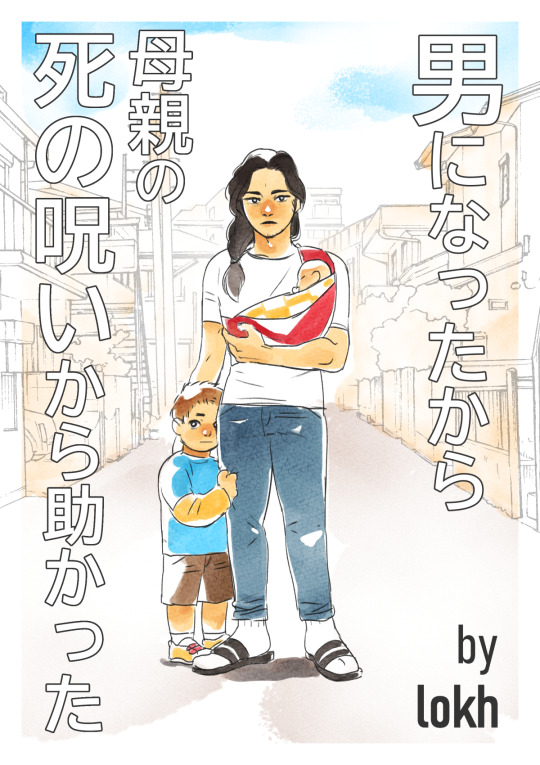
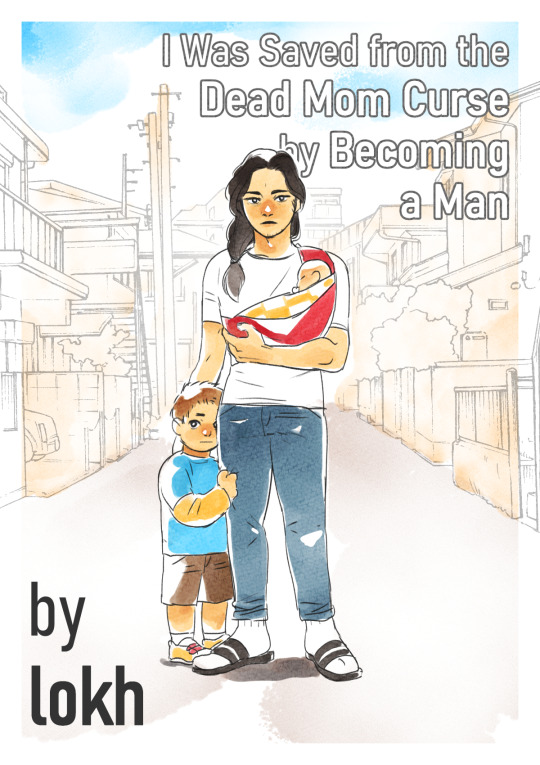
mom avoids dead anime mom curse because he transitions. he’s always had a complicated relationship with pregnancy because of how woefully little people are told about potential complications and aftercare, and also because of how gendered it is, so after the birth of his second child he’s finally had it and decides to transition
he joins a local community group for mothers and at first it’s played for laughs how often they fall to the dead mom curse, but soon we find out more about how society has failed mothers and people who give birth, from information being withheld, procedures being carried out without consent, lack of accommodations and maternal and paternal leave, racism…
it also turns out that becoming a man doesn’t help with this, not really, because being a pregnant trans man brings its own problems. follow along as he learns more about being a parent and a mother, and maybe even… finding love???
coming to you never because I can’t write!
#if the japanese is bad. MY BAD LMAO#this was also a joke for me at first but then i was like well hang on.....#my initial romance thought was his husband leaves him after the transition and eventually a new single father ends up joining the group#cos he like. idk misread the flyer as being a new parents group but the group accepts him with open arms#and hes drawn to the only other guy there and well u know wink wonk.#then i thought well come on thats not. very nice rip what if his husband sticks with him.#but thats why u have more than one trans guy LMAO so it doesnt become bad tokenism!!!!#the older kid also has a complicated relationship with his mom transitioning tbh#art#wow original art from me... ummm.#he also wears glasses but not all the time#GRAPHIC DESIGN IS (NOT) MY PASSION!!!!!#I WANT YOU TO KNOW IF THIS WOULD EVER BE WRITTEN IT WOULD BE GROUNDBREAKING INCREDIBLE.#but it wont because one that would imply that i finish writing anything ever.#two it would require so so much reading. which you should be doing you should be researching.#but the point is there would be a lot because i would think 'oh it had to be perfect' and then would never do it. on top of already#never finishing anything..................#ocs
437 notes
·
View notes
Text
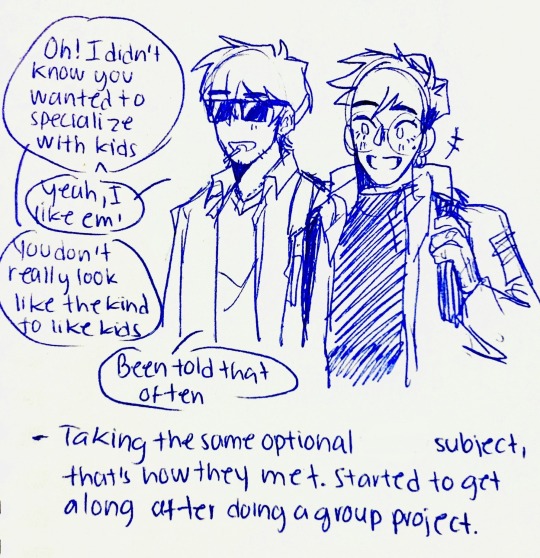
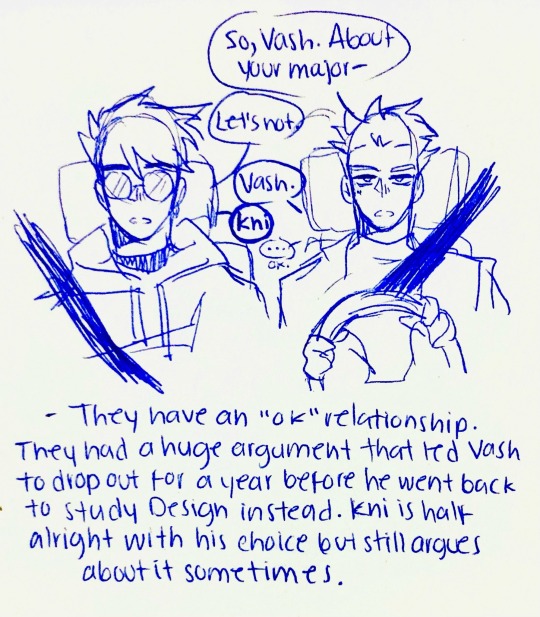
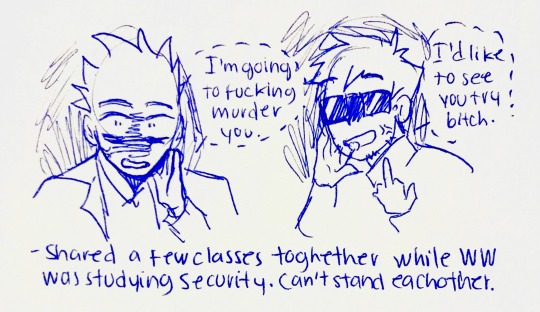
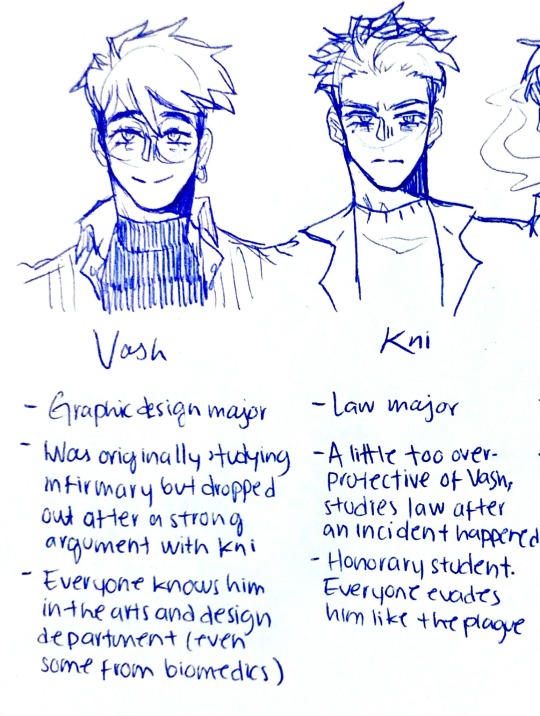
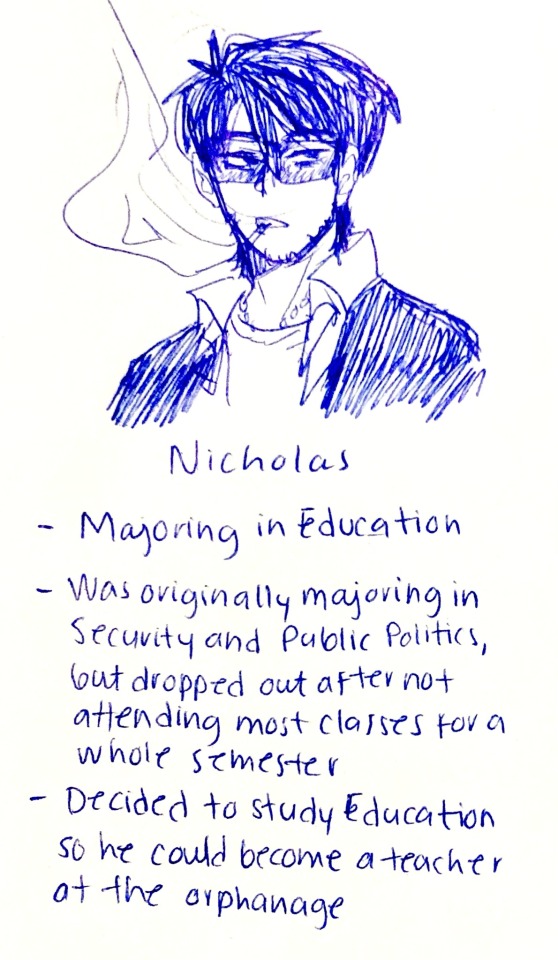
College (uni??) AU catering to my own interests as it should always be hehe :)
#projecting my major on Vash because them mfs who have changed from the med field majors to that one have some tragic things to tell#and also because I think that Vash would be such a wonderful designer I don’t know why it’s a gut feeling#Nai the law major because of course he would have you seen the guy#he would be a personal injury lawyer because lore#fun fact Nai rested for a semester after the incident with Vash while Vash took two.He never told Nai he would be changing majors#so it was a big big shock for him. they fought again but yk I’ll explain more on that if anyone is interested#as to Kni and WW I thought it’d be funny if they shared a common subject that required a lot of team assignments#and they can NEVER work out together. being an absolute nightmare to the rest of their group#separately they are great to work with. even if Kni can come off as too bossy sometimes he is actually a great leader#and WW would always deliver things on time exactly as it was asked from him#but Kni and WW just never really matched. Kni was too rude at times when WW made a mistake and WW would always clock him if he passed a line#like insulting his reasons for wanting to study security#one day Kni tells him at the beginning of a new semester where they both have unfortunately landed on a shared subject again#“you are not suited for that sort of job Wolfwood. you should simply give up and why don’t you go play role model to your little kids’’#then WW beats him again and then is like hey yk what you’re kinda right. and changed majors and he feels so much more at home studying#education/teaching than security. he fucking hates some things but the end goal makes it worthy#Trigun Uni! AU#because I don’t know how differently a college and a uni work#trigun#vash the stampede#nicholas d wolfwood#trigun stampede#vashwood#trigun fanart#wolfwood#vash#Nai saverem#millions knives#lenssi draws#pen!
468 notes
·
View notes
Text
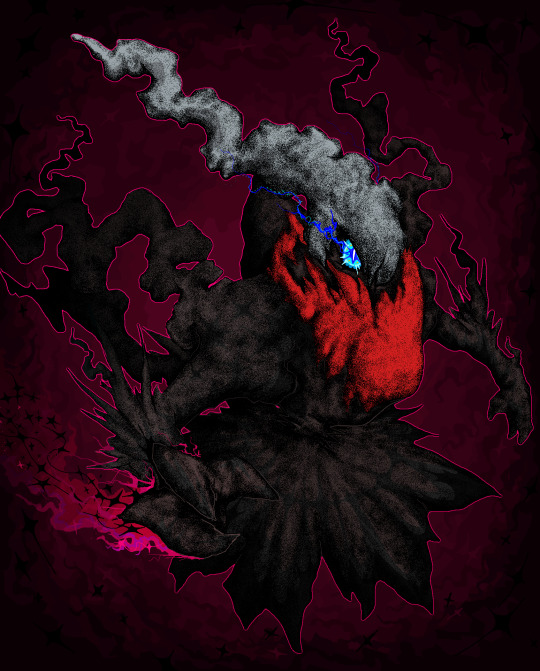
darkraiiiiii
#art#i was brewing up a complicated picture in my head too many factors intermingling and i put a requirement on myself that i would need to#feel a certain mood to create said picture cuz only then would it feel good and true but it was an impossible to achieve mood#and it made me miserable for a week i went to bed as soon as possible everyday to skip to the next one but today i woke up at 2am#and thought well maybe i should just draw something simple that i like it doesnt have to be high concept#so its just darkrai!!!! cuz its such a cooly! and its made out of shapes ive enjoyed drawing recently#smoking fire plumelike stuff u kno...#and i got to try out the spraypaint thing again cuz there was stuff i realized i coulda done better after the red 3 head hybrid pic#so i wanted to do it again. do u like these- with the spraypaint rendering? i will make more of them no matter what u say#but im about to go to bed now. i started the pic at 11am and finished at 8pm so 9hrs spent?! well the stenciling takes a long while in pain#i did the spraying in ms paint again and then composited it in paint net like usually.#also im typing much because the combination of coffee (which i try to make special and rare for me so it hits more cutely)#+ the euphoria that drawing gives me makes me talkative. but now.- ! im tired !! goodnight#pokemon#darkrai
172 notes
·
View notes
Text
Doodles I drew of my fanfic that'll never see the light of day, probably. I've been rotating this in my mind and spewing word vomit onto my document for too long now I had to do something to get it out.


I love Lucifer to the moon and back, but holy hell do I want to see him STRUGGLE.
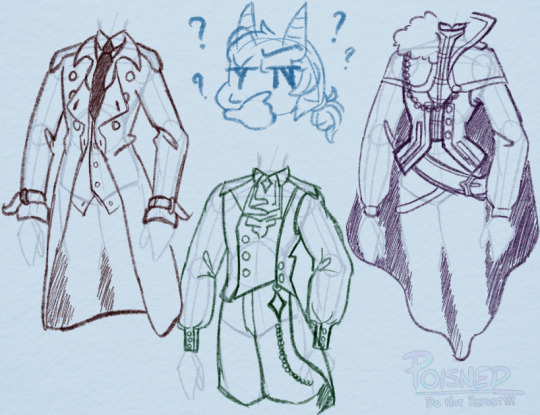

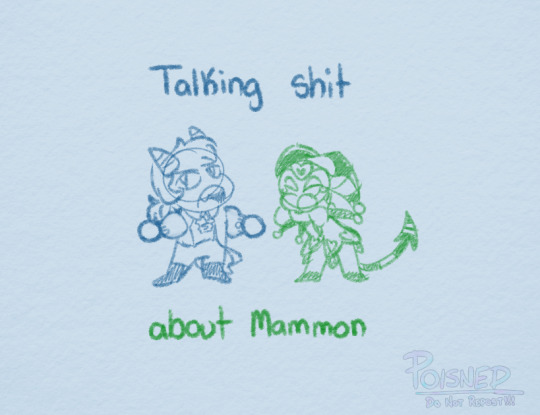

Morningstar!Reader my beloved
#hazbin hotel#hazbin hotel x reader#hazbin lucifer#helluva fizzarolli#helluva stolas#hazbin charlie#do I tag this as x lucifer??#probably not#lucifer & reader#Pois.Posts#poisned.art#X Reader#Reader Insert#fanart#my art#I've thought about posting the fic#but the middle is so incoherent and blurry that there's really no point#i've also thought about taking suggestions for interactions to flesh it out#but that requires interaction which is something my blog doesn't get much of#so it's frankly not really possible#i'll just keep rotating Morningstar!Reader in my own mind#hope you like the out-of-context doodles anyway cause I sure do#also how tf do you draw clothes on people???
86 notes
·
View notes
Text
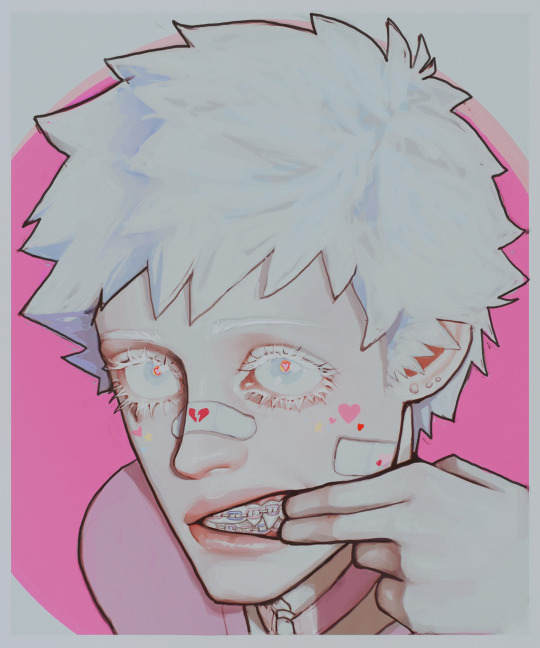
Pastel Nero 🍬
#dmc#devil may cry#nero#devil may cry 5#dmc5#my art#uhhhhhhhh ok so this requires A Lot of context#but the gist of it is i made a purely Vibes and Aesthetics based au where the spardas are vampire hybrids#and nero is super soft and pink and pastel and the twins are goth#and they all look kinda cute and younger bc. vampire ageless powers but also just cause of the Vibes™ bc i thought it would look cool#i dont really have much more but yknow#however i Suck at pastel aesthetic and even tho i have a very clear idea in my head of what nero should look like#he never looks right when i try to draw him so#be gentle pls
86 notes
·
View notes
Text

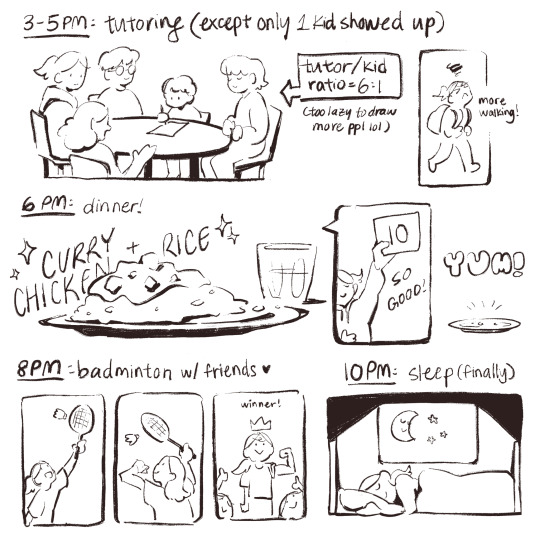
Hourly comics for 2/1/24!
Yes i’m a day late but in my defense i was so busy (see comic)
(no reposts; reblogs appreciated)
#my art#artists on tumblr#original art#digital art#doodles#hourly comics#hourlies#comic#this was so hard actually!#like i can paint for hours straight but comics require a different kind of stamina#college really fixed my mental health by making me busy 24/7#cant be sad if no thoughts head empty#also im older now#and in denial so no im not#oh and#this comic helped me realize how much i love food#(a lot)#sanji would approve i think
100 notes
·
View notes
Text
do we as a society think tom riddle could do math. yes or no
#i tip back and forth on this because on one hand how good was tom’s ‘muggle’ learning at the orphanage#and did it just stop once he started going to hogwarts. or did he study in the summer#but if he Was bad at math and at some point had to face an equation that made him realize it#he’d probably be disturbed at being incapable of something so mundane and just force himself to learn it alone#this raises the question of whether any wizards can do math#especially purebloods#i know draco malfoy would throw up if he looked at a times table#TOM WORKED IN RETAIL. HE HAS TO KNOW MATH….#but wizarding currency is also like Here’s one big gold coin and here’s another coin that’s not as good and#whatever.#take your doubloons#no math required#this doesn’t deserve so much thought but i’m being deranged about it#💤#tom riddle
97 notes
·
View notes
Text
just got done crying it’d be a shame if a pretty boy gave me kisses and held me close while we watched markiplier so i could feel better
#kind of a vent post#i’m having a really hard week actually#sorry for ventposting so much this week btw i just need to get it out of my system and tumblr is somehow the safest place for me to do so#this is kind of an application?? /hj??#watching markiplier not required but he is a major comfort for me#mlm#mlm yearning#gay#gay yearning#mlm thoughts#t4t mlm#nblm#mlnb#ftm mlm#gay mlm
70 notes
·
View notes
Text


So I've been thinking way too much about my ice skating Soriku AU....
Pose based on this video, I've been watching ice skating videos every night for the last few weeks because I can't stop thinking about Sora and Riku skating together.
#soriku#soriku fanart#kingdom hearts#sora kingdom hearts#riku kingdom hearts#sora kh#riku kh#kingdom hearts fanart#soriku art#next time sora will have funny pants i just didnt feel like inventing clothes... just wanted to draw this pose#I WILL WRITE THIS AU SOON. I have a fic to finish and might do a oneshot afterwards but. I will write this very soon#i already have a doc going with ideas and my scattered thoughts#i've spent hours researching ice skating in the last two days omg.#i have to find a balance between being faithful/accurate but also not requiring my readers to do homework to understand terms#pluffie draws#< the never used tag because my arthritic fingers do not allow me to draw much anymore#this is the first time i've ever drawn a profile shot that i didn't hate. idk what i did but it was magic. profile view is so hard for me!!#soriku endgame actually
52 notes
·
View notes
Text
Sort of a distant tangent off my post about Ashton, but I'm growing more and more suspicious of the fandom claim that there's no time for small RP moments in Campaign 3. I do think that it's been challenging to get deeper party bonding or serious conversations that aren't about the big philosophical questions they're facing, since those do take much more time; but then I think about Calamity, or Candela Obscura. I can genuinely give you at least a couple paragraphs about pretty much every relationship in the two Circles, or in the Ring of Brass. I can also point to no shortage of small moments between characters in the Mighty Nein Aeor or Vox Machina Vecna endgame episodes, which were all extremely plot-heavy and fast-paced, and D20 consistently nails character relationships in a fraction of the time.
I think it really does come down to, as Brennan Lee Mulligan always says, the character creation phase. Laying down a solid groundwork in which everyone has a detailed, rich backstory and sense of personality and relationship history (in the case of characters who knew each other prior to the start of the series) is absolutely crucial, and even in the case of characters who don't know each other before going in, a good amount of time spent in character creation ensures that it's easier for them to develop those interpersonal relationships on the fly. I know in actual play there's some degree of finding the character as you play, but there are games for which there is a very short runway, and I don't think it ever hurts to do more extensive character prep than the bare minimum. And if there are gaps, I think it also helps to go back and fill those in mid-way, away from the table - Travis clarifying Chetney's backstory being a great example that allowed the history of Chetney and Deanna to feel realized and full, despite only a few episodes.
I'll also be blunt: most of the time when people complain that there aren't moments because the plot keeps moving...they're mad about shipping. Which has always rung hollow to me. It was a common complaint in C2, that no time was taken for character relationships, despite them taking an entire half of an episode for the Beauyasha date and despite no shortage of moments for all three of the other couples (and plenty of platonic moments between friends). The issue was never a lack of time; it was that the characters they wanted to talk to each other didn't actually have the relationship in canon that the fans had dreamed up, and so, when the chips were down, they went to other people.
It takes two seconds to say something like "I hold their hand", even in the middle of plot-heavy adventuring. If someone doesn't say it, it's rarely the GM rushing them; it's the player either choosing not to do so, or not remembering to do so, and either of those is quite revealing regarding how the player feels about that relationship and where it stands in their priorities.
#i've felt this for a while but like. fundamentally? C3 is just...uniquely not set up for terribly satisfying shipping#even the ships I do like and that get small moments are relatively background#like 80% of quote unquote ship content is like. fanon goggles overlaying either parallel play or standard battle mechanics#which is fine! I think it's a different vibe and approach than the past 2 campaigns#i think especially in character creation; self-insert or easy for new players (c1)#followed by Morally Gray Campaign; Prove We Can Replicate This Success; Serious Characters (C2); followed by Let's Get Silly With It (C3)#which is less conducive to that profound connection of c1 or c2. which is not a bad thing!#but god. if you complain about the D&D show having too much d&d plot and not enough romance...yeah pal it's d&d not a dating sim#like I enjoy when there is romance in my fantasy but it's not a requirement. there is a genre full of romance. it is called romance.#i'm also thinking about this bc I need to watch wot s2 but i've been told that the fandom has gotten weird#like wow so moiraine/siuan is not the A plot? in a high fantasy Good vs. Evil series? WHO'D HAVE THOUGHT.#getting back to this...i'm also thinking about my own life and like. i moved to where i live not long pre-lockdown#and so i'm finding myself a resident of this area for 4+ years but with weaker connections than i'd have otherwise. and that's fine!#but psychologically i feel so weird about just starting to find my place bc it's been so long even though there's a good reason#and i wonder if the cast/Hells feels the same way ie why are we only just bonding now 70 eps in and so they're hesitant#that I Waited Too Long And Now It's Awkward feeling; that I Should Be Past This By Now fallacy#which. again. i think things early on could have been done differently but that time is past you need to live in the present now.#cr tag
75 notes
·
View notes
Text
Okay SO I've never Bad Batch posted beyond reblogs but there's two episodes left and I'm going insane so my big giant theory for why the finale is titled The Cavalry Has Arrived with a sprinkle of Tech is Alive Yes I Am Delusional:
Tonight's episode is going to end with the Batch, Omega's gang, and CX-2 all colliding in one of the hallways.
Big Western faceoff, tumbleweed, yadda yadda y'know.
Right before the shooting starts, CX-2 tells them their escape plan through whatever hallway they're planning is strategically ill-advised, because *insert tactical explanation here*
Hunter: "Oh yeah? What, you trying to help us or something? No thanks."
CX-2: "It was worth the attempt. It's not as if we've ever followed orders anyway."
BIG PAUSE, CLOSE UP MONTAGE OF EVERYONE AS THE WORDS SINK IN
Omega: "...Tech?!"
Tech: *removes helmet to reveal it's him* "Well, I thought it was obvious. Shall we liberate some clones together, then?"
SMASH CUT, ROLL CREDITS, THE CALVARY HAS ARRIVED BECAUSE THE *ENTIRE* BATCH IS TOGETHER AGAIN AND THEY'RE GONNA SAVE THE CLONES.
end conspiracy theory rant. 🥴
#EDIT: SORRY LEFT OUT A BIT OF TECH DIALOGUE I PUT IT BACK JUST IGNORE THIS 😭#no matter what happens the callback to “i thought it was obvious” re: tech and the omega/chip discoveries is required. okay. it just is.#that's his line i need to hear it again okay#also please excuse hunter's dialogue being kinda generic#if it's someone with an accent saying more than a word or two I have to put thought into writing dialogue & this was completely off the cuf#i don't have as much a problem with it as tech because i am also autistic i speak his language 🤣#ANYWAYS i am delusional but i have also been able to predict story beats with fair accuracy for like 10 years so#speaking it into existence. manifesting? i'm still new at tumblr speak sorry 🤣🤣🤣😭😭😭#K8 Rambles about Star Wars#star wars#the bad batch#star wars the bad batch#sw the bad batch#sw tbb#tbb#the bad bad spoilers#sw the bad batch spoilers#star wars the bad batch spoilers#sw tbb spoilers#tbb spoilers#tbb tech#tbb cx-2#tbb cx 2#tbb hunter#tbb omega#tbb wrecker#tbb crosshair#tbb echo#i tagged the whole batch because even if they're not referred to by name they're in the post in spirit
51 notes
·
View notes
Text
Fun theory of mine I’m sure someone smarter’s thought of before—
Juniper is the way he is, evil monologue and all, in part because he approaches his role in Zoraxis as just that! A role. The role of a villain, specifically. And because of his frankly terrible method acting practices, it started to bleed through until it was just part of him as a person.
#purples rambling#I’m sure I could phrase it so much better but. sigh#ieytd2#I expect you to die#John Juniper#ieytd theory#this isn’t exactly what I think because conveying what exactly I think would require a novel and a device#capable of translating thoughts and emotions into words#but it’ll suffice I guess#but like. yes. a large part is his vanity and insecurities Zor has dragged to the surface directly or indirectly#(but very much intentionally)#a large part is based on his feelings as a person#but I’d wager a bet starting out he was acting a LOT more comfortable and in his element than he actually was#doing all these things#and it escalated from there
50 notes
·
View notes
Text
.
#okay look i love louis and i really don't want to cause any discourse but i suppose this is just me gathering my thoughts in one place#i think that this livestream event would've been so much better if a. it had a concert attached to it and b. it was cheaper#like i'm sorry but i already paid £18 to watch it in the cinemas i am not gonna pay £18 more just to get 10 mins of extra footage#and him and charlie talking about the same things again. like we aren't getting any new questions and thoughts#and he would've been way better off by putting it on a streaming platform instead where fans can have access to it anytime#and this coming right after the cancellation of asia leg with zero explanation and one half assed tweet? is just not louis vibes man :/#i am NOT saying there's something going on bts or whatever i'm just saying that the fans deserve an explanation#for the cancellation of the tour dates#and like. sorry but this livestream is not accessible at all. i am not gonna spend £18 on this#and like. £18 is actually SO much in so many countries that i know at the end of it only usa + eu + uk#fans will be watching it so what even is the point#but yeah. one off livestream bad. online streaming platform good. explanation for cancellation required
113 notes
·
View notes
Text
Random Naegi HCs
The Naegi family are naturally good marksmen. Makoto has more raw talent in this than komaru does. This makes them, ironically enough, bad at baseball (their throws are too clean, too straight, and they don't have the raw strength to blitz people) but really good at basketball despite the height.
Komaru is stronger than Makoto, and by a landslide. Makoto is way more flexible, though, so at least he has that over her.
Both can't dance to save their lives. They're singers, leave their two left feet alone!
Komaru can't cook. She will make a fire with water. Makoto will make your kitchen look like a warzone. Everyone thinks the taste is worth the clean-up; it also looks really good!
Komaru is the first to notice all this and just sighs, muttering under her breath, "Isn't it supposed to be the opposite?" She's more jealous that she can't cook than anything. Was in a cooking club to learn before the tragedy.
Komaru calls Makoto Lil bro (as a jab at his height). This has made many people think she's actually the older sibling. There was an event with the future foundation, and komaru was listed as his elder. She laughed her ass off.
Komaru has NO charisma (the utter girl failure) Makoto stole it all. She talked her way INTO a fight with a pacifist by pure accident (both were trying to avoid conflict).
Makoto's talk no jutsu could almost count as brainwashing. Assassins after his head have learnt to plug their ears, because You Stand No Chance Otherwise.
Makoto is scared of fighting any woman, not out of a sense of honor or anything, he just assumes they can bend him like a pretzel (he's right, 9/10 times he's out under 5 seconds in direct confrontation).
Makoto only read manga because Komaru was into it, he's more of a... literally anything else guy. He liked some of the fluffy and Shonen manga the most.
Komaru reads BL (and yes, Makoto read some of them with her), and Toko Can't Stand It, literally has a No BL policy. Genocider and Komaru have a sorta book club over it. Could probably stop Genocider from committing any crimes (or drop anything she's doing) by saying Komaru wants to share manga recommendations.
Makoto is a complete malewife, cleans, cooks, does the laundry, is good at makeup if he ever learns, can wrap up wounds and scold you (gently) so well, but is utterly horrible at fashion. ("I can just... grab whatever, right?") He has no idea why Komaru is so smug that she has good fashion senses.
Makoto is super naturally cold, even with his shirt, thick jacket, and BLAZER combo he sometimes still feels cold! Could lowkey function as a refrigerator even in the summer. Komaru is the opposite. As kids, they were inseparable when sleeping and are cuddle monsters to this day because of it.
Makoto is naturally drawn towards caliginous colours. Give him all the edgy dark colours, they're his; black is probably his favorite. Komaru doesn't actually have a preference, as long as it doesn't clash when she wears it.
Both naegi's are really good at spotting romances and pairing people up... when it isn't themself. It's genuinely frustrating for others because they can call people getting together before it even gets platonic, but you could pin the naegis to a wall, whisper huskily in their ear before kissing roughly, and you'd have a 50/50 chance that they interpreted it right.
"Oh, we're just friends, why would they be interested?" -both naegis, despite literally raising children with their partners. Both are Actively at risk of becoming black holes.
Komaru is somehow an amazing and HORRIBLE mother. The girl failure energy is too strong. Her (likely adopted) children would trash talk her before they could crawl. It might've been Toko's doing, but still... trash talked by babies. At least the family is loving, and she would never lock any child in a closet... on purpose. 100% apologizes profusely if it happened.
Both are incredibly snarky. Makoto is way less obvious, and he rarely has the chance to be during/after the killing game, but Komaru is a ball of sarcasm and teasing after some therapy. Hina finds both of them bickering with each other and kind of short circuits. (They were both so kind normally??? What was this??? ) She can barely wrap her around the fact that this is their Natural State. Makoto decides to use this to his advantage by being sarcastic/jokingly passive-aggressive when people are least expecting it; Komaru lives for it. It catches even Kyoko off guard for the first few times.
Komaru is good at physics; Makoto isn't and hates it like any other maths related subject. He actually really likes history. Komaru sucks at psychology. Both agree that English sucks. Literature is kinda... there, to them. Both are good at chemistry, but for different reasons. Makoto has a great memory, Komaru is Just Good At It. Can also make it explode at will, for some reason??? No one understands why.
Makoto was gloomy and shy as hell as a child (also an outcast), Komaru was the brave and outgoing one. No one believes her when she says this, ever. (Even as children, people thought Komaru was older because of their dynamic and Makoto relying on Komaru way more than she did him, to outsiders).
Their parents kinda suck.
Makoto has broken several laws, got into fights, and was probably a vigilante at some point. He rarely talks about this. People don't believe any of it until he committed treason.
#danganronpa#makoto naegi#komaru naegi#random thoughts#headcanon#you are now required to inagine makoto dropping the most obvious hints hes a criminal#and no one so much as blinks an eye.#makoto escaped prison bc the cops saw him apologize to a wall he bumped into.#“this kid could not burn someones house down.”#he did in fact burn that house down. he would do it again even.
18 notes
·
View notes
Text
The Witness and the Unveiling
I've been processing the new cutscene for days now and had a lot of good conversations with other people. A lot of people are interested in figuring out what this cutscene means for the lore book Unveiling, which is also my big interest. I'll talk about the lore book itself and how it related to the cutscene and what that possibly means for our understanding of the setting.
A LOT of the text will be super speculative, very long, often abstract and ultimately not conclusive. I'll drop absolutely everything I can think of to discuss about this to try and gather every possible question and possible answers in one place. But the truth is that we don't know the answers to these questions and maybe we never will.
What is the Unveiling lore book?
First things first. The Unveiling is a lore book that we started uncovering at the end of Shadowkeep. Shadowkeep campaign ends with us acquiring a strange artifact: an orb that we recover from the Lunar Pyramid, in front of the statue of a veiled figure. As soon as we touch it, we are transported into the Black Garden and the cutscene with our clone plays.
After this cutscene, we return to the Moon and we give the orb we collected to Eris. At the time of Shadowkeep's original release, Eris worked on the orb for weeks to come, revealing 1 lore tab per week. Every page of this lore book is narrated by an unknown entity who told us about the time before the universe existed and then about the creation of the universe. It also told us about the Gardener and the Winnower, their struggle, their philosophies, what we (Guardians) mean to them and ultimately what might be coming in the future. It's one of the fundamental texts for Destiny.
Is the Unveiling now retconned with the new cutscene?
This is a question that gets both asked and claimed a lot. The answer is no. First and foremost, if we're talking about a hard retcon (Bungie saying that this lore book is no longer considered canon or Bungie simply ignoring to mention it ever again), that is literally impossible. Unveiling is the culmination of a non-vaulted campaign that's considered a big part of the Light and Darkness saga and it will never be removed from canon. This text is not only the ending of a campaign, it is referenced in-game; characters have canonically read it and commented on it, most notably in Witch Queen Collector's Edition and it's directly referenced in the lore book Inspiral from the newest raid which I'll touch on later. But the point is, if they wanted to quickly push Unveiling under the rug, they wouldn't have told us "hey remember Unveiling?" with the Lightfall's raid lore.
If people are talking about a retcon in the sense of "we believed that certain things from this text are true, but now new information is challenging that, does that mean that the original text is being retroactively changed or rendered pointless?" The answer is also no, though with a big caveat. (super long post under)
The thing is that the Unveiling was never 100% proven true. We have always known this. We've received this text from a Darkness artifact and the narrator of it is very clearly both biased and unreliable. The Unveiling is not telling us objective truth, it's telling us a biased interpretation of something that may or may not be truth. There is probably some truth to the Unveiling, which I'll get into a bit later, but it is largely a propaganda piece, meant to sway us to the side of the Darkness and reject the Traveler (Gardener). It uses a familiar and casual language to make it more relatable while it talks about how the Gardener made a fundamental mistake by wanting to introduce complexity and unpredictability to life.
So if new information comes out and says "Unveiling was all a lie or wrong or simply a myth with little connection to reality" it would be perfectly in line with what we know about Unveiling right now. I expected that at some point we should learn directly if Unveiling was just a biased tale filled about something incomprehensible that may never be fully true. The new cutscene does nothing to Unveiling outside of simply giving it a new context and a new way to interpret it. This is not new for the Destiny setting which is actually filled with unreliable narrators, characters who lie and characters who are wrong. As a matter of fact, that's what any setting should be like if it strives for realistic storytelling.
The fact that the Unveiling is directly referenced in the newest lore from the newest raid means that Bungie didn't magically forget about this lore book. They literally basically added two extra pages of it with Root of Nightmares. But we never knew the true meaning of the Unveiling so any new information that confirms or denies certain parts of it makes full sense in the story.
Unveiling and the Witness cutscene
So, what are the issues and contention between these two things? Well, there's a lot. A lot of little details from the Witness cutscene are now putting a lot of original interpretations of Unveiling into question. Did we blindly believe in this origin of the universe myth that the Unveiling told? Is it a complete fabrication? Is there at least a kernel of truth to it? Who wrote the Unveiling?
The biggest divergence comes from the fact that Unveiling claims there are incomprehensible entities that created the universe called Gardener and Winnower; the Gardener becoming the Traveler and the Winnower being completely unknown. The cutscene explicitly calls the Traveler "Gardener" but it's revealed that was a name given to it by the Witness' species when they stumbled upon it on their planet, covered in dirt. How can this be the entity that created the universe?
When the Witness was officially introduced at the end of the Witch Queen, the immediate assumption of many was that the Witness was the Winnower. This is now categorically untrue, at least on some level (will get to it eventually later); the Witness is not an entity that fought the Gardener in the allegorical garden that predates the existence of the universe. So does the Winnower still exist as that entity that fought in the garden?
Let's summarise the Unveiling piece by piece first. First page is an introduction with a lot of grand claims about the nature of existence. It immediately makes it clear that the narrator is selling us a worldview:
But imagine the abomination of a world where nothing can end and no choice can be preferred to any other. Imagine the things that would suffer and never die. Imagine the lies that would flourish without context or corrective. Imagine a world without me.
Pages two, three, four and five claim to detail a time from before the universe existed presented in an allegorical tale about a Gardener and Winnower that live in a garden and play a game. The allegorical language is not subtextual, it's very much explicitly told that this is an allegory.
Once upon a time,* a gardener and a winnower lived** together in a garden.***
* It was once before a time, because time had not yet begun.
** We did not live. We existed as principles of ontological dynamics that emerged from mathematical structures, as bodiless and inevitable as the primes.
*** It was the field of possibility that prefigured existence.
The story goes: before the universe existed, Gardener and Winnower played a game of life. They were able to configure the game board with starting set pieces and then let it play out and see what comes out of it. The end of the game was always the same; the same pattern would always win and the game's ending would always be predictable. This bothered the Gardener who wanted complexity and freedom. It didn't bother the Winnower; the Winnower prefered the clean and clear cut outcome that always follows the same principles and always leads to the same conclusion.
Page six is an interjection with a philosophical question about the nature of a specific protein. The page explains it to us and asks if this protein is an agent of Darkness or the Light. This is not entirely relevant to the topic at hand, but it's important for the understanding of how Unveiling is trying to exert its bias onto the reader by presenting some sort of a gotcha. It wants us to come to the conclusions that benefits the narrator.
After that, page seven resumes the origin story of the universe. They fought together in the garden about their differences and about the Gardener's decision to make a new rule for the game. Their fight was so fundamental that it led to the creation of the universe. The chapter title is "T=0" which means "time equals zero" and is a part of understanding how the universe was made out of nothing.
The garden had given birth to creation, the rules were in place, and there would never be a second chance. We played in the cosmos now. We played for everything.
Page eight returns to trying to sway us to its side by telling us that the concept of predation is what made all of life possible and that it is the narrator who is responsible for our existence.
It was the first defector—the first predator. It changed everything. Now the oozeballs needed sensors to watch for danger, and brains to integrate those senses and generate plans of survival, and swift neurons and muscles to enact that plan. This was the Cambrian Explosion, the great birth of complex life on your world. I caused it. I, the defector, the destroyer, the one who takes.
It's selling us a worldview again. It wants us to believe that the reason we have everything we do is because of the sword logic; everyone fighting for the right to exist. When everyone fights, everyone has to evolve to defend and survive, therefore the reason we've evolved is because we had to fight. This is a huge contrast with how the Gardener works. The Gardener jumpstarts and uplifts species by gardening, terraforming, evolving them without the need to struggle. The Gardener also doesn't pick and choose when it comes to terraforming; everyone is equally important and you don't have to justify or prove your right to exist. An ant's value is the same as a human's. To the narrator, that simply cannot be. If the ant can't prove the right to exist by being stronger, then it should not exist. This always showed bias and the way this ideology works on the misinterpretation of the "survival of the fittest" phrase; survival of the fittest isn't "survival of the strong" it's "survival of those who are best adapted to their environment."
Page nine is very important and is one of the things that makes Unveiling possibly true in some aspects. Namely, this page called Patternfall, is about the Vex. The narrator describes the Vex and how they existed in the allegorical garden from which they escaped into the universe with the Big Bang. Before the battle between Gardener and Winnower, the Vex, this pattern, always won the game. The Vex were the winning outcome of every game played, the source of Gardener's frustration and Winnower's elation.
Given that we know that the Vex are real and that they have a... tenuous relationship with time, this part of the story feels correct. It would make sense that the Vex predate time itself, which would explain why they are able to navigate it and manipulate it as easily as we manipulate any other force; the Vex already existed when all of time was a singularity before the Big Bang, this is known to them. Not only that, but the Vex can't understand paracausality, which was added to the game as a new rule, a rule they've never seen before. The description of the Vex in this chapter is also on point so it's has to be correct or close to correct.
They propagated in the saline meltwater of comets orbiting the first stars. That broth of chemicals became their substrate, and they learned to catalyze impossible chemistry with quantum tricks. Then, they rained from the sky into the steaming seas of fallow worlds, and there they built their first housings from geometry and silica.
We know that they are linked to first stars because of Clovis Bray's expedition to 2082 Volantis, an impossibly old star dating back to the beginning of the universe that the Vex have kept artificially alive ever since by refuelling it.
In all their transformations, they retained that kernel of ultimate self-sufficiency that had made them victors in the flower game.
But they are not incontrovertibly destined to rule this cosmos. They were made before Light and Darkness, but the rules are different now, and even this pattern must adapt.
Patternfall also makes a note about the Vex that are alligned with Darkness: Sol Divisive of the Black Garden.
They are not all mine, not in the way that admirers such as my man Oryx are mine: utterly devoted to the practice of my principle. But some of them have, nonetheless, found their way home.
This specific page tells us that at least in some way, some sections of the Unveiling must be telling an objective truth, or at least be as close to the truth as possible. Barring any new reveals about the Vex, this seems to fit with what we know about them so it must be correct. The Vex are the way they are because they predate the universe and their existence in the universe right now is the only remnant of a time before time. They used to be the final shape, always, until paracausality was introduced and now they must fight with the rest of us to reclaim their position. This means that the allegorical garden where the Gardener and Winnower lived and fought must be in some way real. Remember, we are talking about a time from before the universe. The word "real" is a very loose description of that place, but the Vex must've come from there and possibly have a memory of being there so it there must be a "there" before the Big Bang. Mind boggling stuff going on. (As an aside, the Vex HAVE to be the core of The Final Shape expansion. They gotta. Also note that there is a weird metaphysical space on the other side of the portal)
Speaking of aspects that have to be true or at least reflect truth; there is the Tree of Silver Wings. This is mentioned throughout Unveiling as a tree that existed in the garden that was toppled when the Gardener and Winnower fought. The Tree is clearly real because we've seen iterations of it several times now. A completely new Tree was grown in the cradle on Io and now we can also see the Tree in Root of Nightmares, growing at the cradle on the Witness' Pyramid. The seeds of the Tree are also real; Osiris had one and so did Calus and we've seen both. How does the allegorical Tree from an allegorical garden from before the universe existed relate to the real Trees in a very real universe is completely unknown.
Page ten is a lot more attempts to convince us that the narrator is the correct choice to follow and that its philosophy is the winning one and that we should abandon the Gardener and join them. The narrator also tells us that we don't have rush with our answer because it is coming over to meet us anyway. This was the end of Shadowkeep so it was quite an ominous message. The Shadowkeep year ended with the arrival of the Black Fleet to our system and then was further expanded in Beyond Light where we gained a more direct contact with them and their gifts of stasis.
The final page, eleven, is Eris' message to us about hope and resistance to the allure of Darkness. Mind you that she's not talking about using aspects of Darkness as tools, but more about the philosophy of it as it's presented in Unveiling; you can use the Darkness without entertaining the Darkness and the philosophy of the extreme version of the sword logic.
Okay, so what's the issue between this and the Witness cutscene? Well, before the reveal of the Witness in general, we believed that the narrator of the Unveiling, the Winnower, is the big bad. The entity that is the origin of Darkness, the entity that made the Black Fleet, the entity that controls our enemies. This was never confirmed, but it was a reasonable conclusion to Unveiling, until further notice. Now we know that some parts of this aren't true. The Witness is the big bad and the Pyramids are just the remains of its species' technology. And while the Witness does fulfil some of the roles of the Winnower, we now know that the Witness is not the origin of Darkness so it cannot be the Winnower that's spoken of in Unveiling, not the Winnower that existed before the universe.
The Witch Queen and some hints here and there before that (mostly in the Presage mission where Savathun more or less explicitly told us that the Darkness is not the same as the entity that we're fighting against) introduced the Witness directly without any metaphors or vague language. We finally saw this being, in full glory, as it emerged, moved and spoke. From then until now, we've tried to understand the Witness but we really knew nothing substantial.
A lot of conversations were about the nature of the Witness and the Winnower, the narrator of Unveiling. Were they the same thing? Or are they separate entities? Is the Winnower even real or is it literally just a metaphor for a philosophy, an idea, that the Witness represents? There's always people who will immediately clamor about "retcons" but once again, the Unveiling was never an objective truth. We made assumptions about the Unveiling and its narrator, but none of those assumptions were ever confirmed in any way. This is also reflected in-game with characters discussing the meaning of the Unveiling in many different ways. Unveiling being unreliable and unclear was intended. The Witness existing does not contradict or remove Unveiling's significance. It just recontextualises and already unreliable text that was never objective to begin with.
And it continues to do so. The Witness cutscene first and foremost shows us the Traveler, curiously covered in dirt and depicted almost as if it's rising from the ground. The Witness' people are described as discovering it and naming it "Gardener." It then uplifted them, terraformed their world and gave them a golden age which is familiar to us.
But wait. If the Gardener is from a time before the universe, how is it now suddenly a dirt covered orb on a random planet? This is where the Unveiling being interpreted literally becomes a problem. If the Gardener (and Winnower) aren't from a time before the Big Bang and that whole allegory of a garden that existed before the universe is a lie, then what is the Unveiling and who wrote it and for what purpose?
I've seen a lot of good discussions on it that I'd like to highlight here. This post discusses things in a similar way to what I'm writing here, for example. Just a little while ago, I reblogged this interpretation of it which I really like which differs from this. There's been a lot of various similar theories in which the Witness has simply created this idea of the Winnower and the associated philosophy after it went through an existential crisis of catastrophic proportions; the Unveiling is simply entirely a lie, an attempt to make people believe the winnowing philosophy.
It's a good question to ask what of the story of the Vex and the Gardener if Unveiling is fully a lie. A really important note here is that we've known from other sources that the Traveler is the Gardener. Both from other characters, most notably in Lightfall from Osiris, but also from the Traveler itself and the Unveiling. So if Unveiling is bullshit, what about the Vex and the Gardener? Why did the Gardener even appear on the random planet from the dirt?
My theory is that Unveiling is partially correct. Something incomprehensible WAS happening before the universe existed; it involved forces that would end up becoming the Light and Darkness, the Gardener, the Vex and probably the Veil. This period of time is so abstract and unfathomable that we cannot physically understand it through anything but allegory. Some believe that the Veil now fulfils the role of the Winnower which is possible, but I'm not sure how likely; we will need even more information on the Veil to make that judgement call. Either way, Unveiling's myth about the origins of everything could still hold true in some regard. If that's true, we know that the Gardener made the new rule for the game (paracausality), caused the Big Bang and inserted itself into the new game (aka into the universe). The Gardener thus became the Traveler which it has refered to as being its body.
It feels like lead and neutronium and electroweak matter fashioned into a moon-sized ball that you must carry as you move.
The time before the universe wasn't physical, but the universe is. This body, the Traveler, had to have been made and it's possible that it was made on the Witness' planet. Perhaps that was one of the first planets in existence, a place where the Gardener forged its body and emerged into the existence as a physical being capable of terraforming. The Light is the domain of the physical so it makes sense that the Gardener has to utilise this physicality to be able to do its thing.
The Darkness is psychic; it's emotion, consciousness, the mind. It doesn't have to be physical. Perhaps the Winnower IS real, but it's simply a metaphysical idea that exists in the universe, but cannot be seen. It can influence others; everyone who ponders on the nature of existence runs the risk of being exposed to the idea of winnowing. It's inevitable. Every conscious being can be influenced by Darkness and it's many possibilities; some perfectly neutral or even good and some bad.
And the Witness' people went highly in-depth in their research of the Gardener and then later the Veil. If they were looking for answers to meaning and purpose, they would've likely come close to understanding the origin of the universe. Perhaps from the Gardener (who was there, before the Big Bang) or perhaps by exploring the Veil (which is, as of now, still fairly unknown as an entity) or maybe even the combination of their investigation into both of those. There's some credence to this in particular, given the memory from Ahsa in week 3, mainly this part:
Two halves of a whole... long divided. A... schism between them. Reunited. [exhales in joy] A glimpse beyond... to the beginning...
This most certainly refers to the Traveler and the Veil being reunited and connected as the Witness' people attempted the connection for the first time. And it offered them "a glimpse beyond to the beginning." Beginning of what if not the universe? The connection was never fully realised and the two were never fully reunited. But they were in Lightfall and in Lightfall, this created a portal to an incomprehensible realm into which nobody but the Witness can enter (for now). This realm acts as if it exists somewhere outside of normal spacetime, somewhere beyond, and it resembles... well, a garden world, like a garden from the allegory of existence before the universe.
If the Witness' people saw how the universe began as explored in the Unveiling, they would've absolutely come to the conclusion that everything is meaningless and that the Gardener did something that led to untold suffering, basically on a whim to seek more complex, but ultimately pointless life. Instead of this perfectly ordered garden world where every outcome is known and there is no deviation from the rules, we received a universe that is seemingly random, chaotic and meaningless. At least that would be the interpretation of it in their mind.
The Gardener could've just let things play out infinitely in the game with the same outcome, with the same pattern, but it didn't. It made the universe instead, filled with infinite mysteries and infinite possibilities and you will never know which one of those possibilities are "correct" and which choices are better than others. You will never know where to go and who to follow and what to do and there is no inherent value to any specific choice you make. Countless species will live and die "without meaning and purpose."
This was terrfying to the Witness' people, possibly exactly because they've seen how things were before. Before the Gardener's actions, everyone would have a specific purpose to fulfil in service of reaching the final shape which is always the same. Now, there is no goal, nothing to work towards, nothing to specific to strive for. So they decided to follow the philosophy of an entity that fought the Gardener and take up its job; to winnow in search for the final shape. To reshape reality, reset existence, "free" the Gardener from its own creation.
In that way, Unveiling is still very much true and it's the same as ever; it's a subjective interpretation of the origins of the universe told in a biased nature by a being that learned to despise the chaos of existence and would want to return to the way things were before.
So who wrote the Unveiling then? Again, many theories. Since the Witness' reveal in WQ, a lot of people speculated that the Witness wrote it and that the Witness is same as the Winnower. That could be true now, in a way; the Witness took up the mantle of the Winnower so it might as well be it. The Unveiling is written with a tone and voice that differs from how we know the Witness, but now we also know that the Witness is a being of billions; perhaps there is a voice in there who writes text and who speaks that way. It could also be just a ruse; the Witness is a manipulator who lies constantly. It could've written this text in this way to deliberately confuse, manipulate and coerce us; the Unveiling "tone" is fake and it was also fake when it spoke to Oryx.
Another option is that Unveiling was still written by the entity we know as the Winnower. If the Winnower is the origin of Darkness, coming from the garden from before the universe, then it is metaphysical; it's in the mind and consciousness. It doesn't need a body or to be fully physical. It can influence and talk and BE simply by being the origin of consciousness. Every conscious being can access the Winnower. The Winnower is every idea that leads to predation and killing and death. It's every thought and dream and memory and pain. It could've touched the Witness' people and pushed them to adopt its philosophy when they went too far with their research and especially when they connected to the Veil. It could've tried doing the same to us, when we connected to the Darkness artifact in a Pyramid at the end of Shadowkeep.
There is also the angle that the tale from Unveiling is literally entirely untrue. There was nothing before the universe existed. The description of the Vex was the Witness' attempt to understand how they function, or a piece of truth added to make the rest of the text seem correct to those that read it. The myth of the garden and the two entities fighting could be an attempt to give meaning to how everything started, giving a reason to pursue the Traveler and feel justified doing it.
The main point here is that we don't know and we might never know given the incredibly allegorical and mythologised way that Unveiling is talking about something that is incredibly hard to conceptualise in the first place. An interesting bit to add here is the concept of egregore:
Egregore (also spelled egregor; from French égrégore, from Ancient Greek ἐγρήγορος, egrēgoros 'wakeful') is an esoteric concept representing a non-physical entity that arises from the collective thoughts of a distinct group of people.
It's not an accident that egregore in Destiny is a physical manifestation of psychic connections that links points of Darkness together. It comes from this originally; basically if enough people think about the same thing or believe in the same thing, they will create an "egregore" = their thought or belief will spawn a non-physical entity associated with that thought or belief. In that sense, the Witness' people may have created the Winnower when they all united in thinking about how the universe is meaningless without a Winnower. The Winnower is an egregore created by the Witness' people and the belief in this egregore manifests physically as the egregore fungus which infests and links everyone who believes in the Winnower. Perhaps, even, if the Winnower is that egregore, something created by the first beings that ventured that far into metaphysics and then it retroactively became tied to the universe. Once the Winnower was created, the Witness' people tried explaining where it fits into the universe, constructing an origin myth around it. Perhaps they weren't aware that they manifested the Winnower, and believed that they simply discovered it and that the origin myth they constructed was them learning some bigger truth.
There are issues and questions with any of these explanations and they all go into super abstract possibilities and options. If the garden before the universe is entirely a myth, then what of the Gardener and the Vex and the Tree of Silver Wings? If there's truth to how the universe began, what about the Witness being simply a species that got uplifted and went mad with horrors of knowledge? Was the Winnower real in the garden before time or is it merely something conjured from the minds of a people who wanted purpose and meaning?
Furthermore, what about Inspiral, the raid lore book whose last two pages are very reminiscent of the Unveiling, reference it and function almost like extra two pages for it? Inspiral is particularly strange because each page starts with a description of a being that left its memories in the book. First of the final two pages, Meaning, describes its narrator as:
A dream of a metaphor made starkly, an allegory discussed in study of ontology, in Darkness not unkind. It leaves behind a warped, barely-real data fragment to mark its passing.
And the second, Winnowing:
A dream of a friendly conversation with someone impossible to see, cloaked in shadows. It leaves behind an impossible data fragment to mark its passing.
Neither of these descriptions fit the Witness. The Witness is not a metaphor or an allegory, nor is it "barely-real." It is also not "impossible to see" nor does it leave behind "impossible data." The Witness is very much real, though clearly ascended into a state of being beyond our comprehension, but we can very much hear it and see it. The cutscene very clearly explains that the Witness began as just another species and achieved a higher existence; it's not some weird mystical energy that originated before the universe began. Most of all, the Witness is neither kind nor friendly.
The only metaphor and allegory is the garden from before the universe and the Gardener and the Winnower that fought in it. The Gardener manifested as the Traveler, but the Winnower is unknown to us. These two pages read, again, almost exactly the same as Unveiling and they bear no resemblance to the Witness, neither in tone nor in the description of their narrator(s). Obviously, it could be lies and manipulations on purpose which is something to keep in mind in general.
But the page Meaning very clearly makes a distinction between two entities:
There is a voice that echoes across the Darkness, and it asks this question: what is the purpose of it all?
And there is another voice that calls back and says: listen, I will tell you a purpose. I will tell you of a Final Shape.
After seeing the cutscene, the first sentence could obviously refer to the Witness' people. They sought purpose and meaning. The second specifies that something answered, something else, when they dug deep into the Veil. Did that something exist on its own, predating the Witness, or did the Witness create it, like an egregore? Either way, the Witness inquired and something returned the call OR the text is referring to a generalised idea of anyone exploring the Darkness, asking that question and then getting a reply from the Winnower, which is a creation of the Witness.
On the other hand, there's the issue of the Darkness being a much more complex phenomenon than we've previously believed. If the Winnower is the origin of Darkness, then would it not represent ALL of Darkness? As of right now, both Unveiling and Inspiral pages that we might be able to attribute to the Winnower are distinctly focused only on the sword logic aspect which fits more with the Witness. The Witness and its pawns have extermined species that also used the Darkness, in different ways. Would the Winnower not acknowledge the entirety of Darkness? This issue can be better solved if we insist that the Witness is what invented or manifested the Winnower and its ideology. Darkness is more than winnowing, that's for sure, but the Witness and its manifestation of the Winnower are focused only on winnowing.
Some more concrete answers may lay in our understanding of the Veil. We're beginning to gather more information about this entity and the cutscene itself shed some light on it as well. The Veil was connected to the Traveler, always, even before the Witness' people found it. It was not near the Traveler, but instead somewhere far away where the Witness' people had to fly to in order to bring it back. Some already believe that the Veil is the Winnower or a product of it; that the Winnower and the Gardener were these abstract entities in the garden before the universe and then became the Veil and the Traveler post-Big Bang, but still connected.
The truth is that this is a highly complicated concept to think about, explore and explain. The Unveiling could be one being's attempt to explain how the universe began and it could be true or it could be false. Nothing in the cutscene explicitly tells us either way, nor does it render the Unveiling useless (and it also doesn't render it a word of god).
The science and philosophy about the origin of the universe are unknown in real life and will probably remain unknown in Destiny. To expect a fictional story to accurately and unambiguously tell us how the universe began is to expect A LOT. The only ones that could truly maybe tell us are the Traveler (Gardener) and the Veil. The question is, would we be able to withstand knowing something like that. Many who peered into the Veil have lost their minds and the Traveler does not speak of things like that because divulging such information would inevitably put someone on a set path. To know everything is to lose choice. You know exactly where to go, how, when and why, as well as what will happen when you get there. The Gardener wants us to make our own fate and it wants the universe to not lead into any specific outcome.
This is some of the most bizarre and wild high concept scifi stuff we've ever had in Destiny. I don't expect us to solve it so quickly after major new information has been revealed and there's still a lot more to find out. This is a really exceptionally long dive into some of the theories and options. A lot of people don't like this type of unreliable philosophical conundrums and would much rather just prefer to be told the facts. And I don't think we'll ever know facts about these topics in a way that would make them easy to digest. Unveiling might one day be fully explained in a way that will allow us to construct the true history of the universe and its origins, but it might also not be. Perhaps it will remain a perpetual mystery to force to wonder about these concepts.
I'd personally prefer a little bit of mystery to remain; for both us and the Witness to forever wonder what was the meaning of it all, what was our purpose, have we chosen it "correctly" and what our choices could've led to if we've done things differently.
#destiny 2#destiny 2 spoilers#season of the deep#season of the deep spoilers#witness#unveiling#lore vibing#long post#i did say this cutscene made me insane#and then also it brought up questions about the unveiling and unveiling makes me super insane#long rambling post be upon ye#i really enjoy reading thoughts on this so if anyone would interpret something differently or has better evidence feel free to share#also btw don't feel bad if this is all super confusing#i believe the story around it very much intended to give us a headache and require like 4 degrees in philosophy#i myself am also confused by a lot of the points raised by this whole thing#being confused is not a inherently a bad thing. we are moved to learn by confusion#it pushes us to want to explore and understand#i love this incomprehensible eldritch scifi shit that makes me question existence and reality#no wonder people go insane when they start unraveling the knowledge about the universe
87 notes
·
View notes